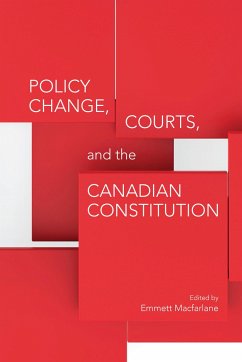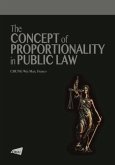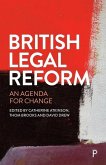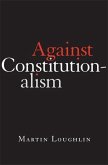Policy Change, Courts, and the Canadian Constitution
Herausgeber: Macfarlane, Emmett
Policy Change, Courts, and the Canadian Constitution
Herausgeber: Macfarlane, Emmett
- Broschiertes Buch
- Merkliste
- Auf die Merkliste
- Bewerten Bewerten
- Teilen
- Produkt teilen
- Produkterinnerung
- Produkterinnerung
Policy Change, Courts, and the Canadian Constitution examines the impact of courts and various constitutional provisions on a wide range of policy issues, including health care, immigration and refugee policy, citizenship, the rights of Indigenous peoples, and criminal justice policy.
Andere Kunden interessierten sich auch für
![Leading Works in Public Law Leading Works in Public Law]() Leading Works in Public Law142,99 €
Leading Works in Public Law142,99 €![The Concept of Proportionality in Public Law The Concept of Proportionality in Public Law]() Chung Wai Man FrancoThe Concept of Proportionality in Public Law54,99 €
Chung Wai Man FrancoThe Concept of Proportionality in Public Law54,99 €![Global Contract Law in the Middle East and North Africa Global Contract Law in the Middle East and North Africa]() Mohamed IsmailGlobal Contract Law in the Middle East and North Africa152,99 €
Mohamed IsmailGlobal Contract Law in the Middle East and North Africa152,99 €![The Law, Politics and Theory of Treaty Withdrawal The Law, Politics and Theory of Treaty Withdrawal]() Frederick Cowell (UK Birkbeck College)The Law, Politics and Theory of Treaty Withdrawal129,99 €
Frederick Cowell (UK Birkbeck College)The Law, Politics and Theory of Treaty Withdrawal129,99 €![British Legal Reform British Legal Reform]() British Legal Reform24,99 €
British Legal Reform24,99 €![Against Constitutionalism Against Constitutionalism]() Professor Martin LoughlinAgainst Constitutionalism45,99 €
Professor Martin LoughlinAgainst Constitutionalism45,99 €![Digital Currencies and Public Law Digital Currencies and Public Law]() Andrew DahdalDigital Currencies and Public Law158,99 €
Andrew DahdalDigital Currencies and Public Law158,99 €-
-
-
Policy Change, Courts, and the Canadian Constitution examines the impact of courts and various constitutional provisions on a wide range of policy issues, including health care, immigration and refugee policy, citizenship, the rights of Indigenous peoples, and criminal justice policy.
Hinweis: Dieser Artikel kann nur an eine deutsche Lieferadresse ausgeliefert werden.
Hinweis: Dieser Artikel kann nur an eine deutsche Lieferadresse ausgeliefert werden.
Produktdetails
- Produktdetails
- Verlag: University of Toronto Press
- Seitenzahl: 464
- Erscheinungstermin: 24. November 2018
- Englisch
- Abmessung: 226mm x 152mm x 30mm
- Gewicht: 702g
- ISBN-13: 9781487523152
- ISBN-10: 1487523157
- Artikelnr.: 52420938
- Herstellerkennzeichnung
- Libri GmbH
- Europaallee 1
- 36244 Bad Hersfeld
- gpsr@libri.de
- Verlag: University of Toronto Press
- Seitenzahl: 464
- Erscheinungstermin: 24. November 2018
- Englisch
- Abmessung: 226mm x 152mm x 30mm
- Gewicht: 702g
- ISBN-13: 9781487523152
- ISBN-10: 1487523157
- Artikelnr.: 52420938
- Herstellerkennzeichnung
- Libri GmbH
- Europaallee 1
- 36244 Bad Hersfeld
- gpsr@libri.de
Edited by Emmett Macfarlane
Introduction: Judicial Policy Impact in Canada
Emmett Macfarlane (University of Waterloo)
PART I - Approaches and Theories of Policy Change
Chapter 1: Lessons from Public Policy Theories: Ask About Policy Change
First, Courts Second
Minh Do (University of Toronto)
Chapter 2: Closing a Door but Opening a Policy Window: Legislating Assisted
Dying in Canada
Dave Snow (University of Guelph) and Kate Puddister (University of Guelph)
Chapter 3: The Supreme Court of Canada, Judicial Remedies, and Punctuated
Equilibrium
Marc Zanoni (University of Guelph)
PART II - Institutional Contexts
Chapter 4: The Charter, Policy, and Political Judgment
Janet Hiebert (Queen’s University)
Chapter 5: Collaborative Federalism and the Role of the Supreme Court of
Canada
Robert Schertzer (University of Toronto)
Chapter 6: The Impact of Constitutional References on Institutional Reform
Kate Glover (Western University)
Chapter 7: The Desuetude of the Notwithstanding Clause - And How to Revive
It
Richard Albert (University of Texas at Austin)
PART III - Policy Issues
Chapter 8: The Charter Beat: The Impact of Rights Decisions on Canadian
Policing
Troy Riddell (University of Guelph) and Dennis Baker (University of Guelph)
Chapter 9: Protecting Against Cruel and Unusual Punishment: Section 12 of
the Charter and Mandatory Minimum Sentences
Kate Puddister (University of Guelph)
Chapter 10: Third Party Policy and Electoral Participation after Harper v.
Canada: A Triumph of Egalitarianism?
Erin Crandall (Acadia University) and Andrea Lawlor (Western University)
Chapter 11: Section 23 of the Charter and Official-Language Minority
Instruction in Canada: The Judiciary’s Impact and Limits in Education
Policymaking
Stéphanie Chouinard (Royal Military College of Canada)
Chapter 12: The Charter of the French Language and the Supreme Court of
Canada: Assessing Whether Constitutional Design Can Influence Policy
Outcomes
James B. Kelly (Concordia University)
Chapter 13: When is a Citizen No Longer a Citizen? Analyzing Constructions
of Citizenship in Canada’s Judicial and Legislative Forums
Megan Gaucher (Carleton University)
Chapter 14: Taking the Harper Government’s Refugee Policy to Court
Chris Anderson (Wilfrid Laurier University) and Dagmar Soennecken (York
University)
Chapter 15: Carter Conflicts: The Supreme Court of Canada’s Impact on
Medical Assistance in Dying Policy
Eleni Nicolaides (University of Guelph) and Matthew Hennigar (Brock
University)
Chapter 16: Canadian Abortion Policy and the Limitations of Litigation
Rachael Johnstone (Queen’s University)
Chapter 17: Contrasting Visions of Indigenous Rights, Recognition, and
Territory: Assessing Crown Policy in the Context of Reconciliation and
Historic Obligations
Michael McCrossan (University of New Brunswick)
Chapter 18: After Marriage Equality: Courting Queer and Trans Rights
Kyle Kirkup (University of Ottawa)
Conclusion: Policy Influence and Its Limits: Assessing the Power of Courts
and the Constitution
Emmett Macfarlane (University of Waterloo)
Introduction: Judicial Policy Impact in Canada
Emmett Macfarlane (University of Waterloo)
PART I - Approaches and Theories of Policy Change
Chapter 1: Lessons from Public Policy Theories: Ask About Policy Change
First, Courts Second
Minh Do (University of Toronto)
Chapter 2: Closing a Door but Opening a Policy Window: Legislating Assisted
Dying in Canada
Dave Snow (University of Guelph) and Kate Puddister (University of Guelph)
Chapter 3: The Supreme Court of Canada, Judicial Remedies, and Punctuated
Equilibrium
Marc Zanoni (University of Guelph)
PART II - Institutional Contexts
Chapter 4: The Charter, Policy, and Political Judgment
Janet Hiebert (Queen’s University)
Chapter 5: Collaborative Federalism and the Role of the Supreme Court of
Canada
Robert Schertzer (University of Toronto)
Chapter 6: The Impact of Constitutional References on Institutional Reform
Kate Glover (Western University)
Chapter 7: The Desuetude of the Notwithstanding Clause - And How to Revive
It
Richard Albert (University of Texas at Austin)
PART III - Policy Issues
Chapter 8: The Charter Beat: The Impact of Rights Decisions on Canadian
Policing
Troy Riddell (University of Guelph) and Dennis Baker (University of Guelph)
Chapter 9: Protecting Against Cruel and Unusual Punishment: Section 12 of
the Charter and Mandatory Minimum Sentences
Kate Puddister (University of Guelph)
Chapter 10: Third Party Policy and Electoral Participation after Harper v.
Canada: A Triumph of Egalitarianism?
Erin Crandall (Acadia University) and Andrea Lawlor (Western University)
Chapter 11: Section 23 of the Charter and Official-Language Minority
Instruction in Canada: The Judiciary’s Impact and Limits in Education
Policymaking
Stéphanie Chouinard (Royal Military College of Canada)
Chapter 12: The Charter of the French Language and the Supreme Court of
Canada: Assessing Whether Constitutional Design Can Influence Policy
Outcomes
James B. Kelly (Concordia University)
Chapter 13: When is a Citizen No Longer a Citizen? Analyzing Constructions
of Citizenship in Canada’s Judicial and Legislative Forums
Megan Gaucher (Carleton University)
Chapter 14: Taking the Harper Government’s Refugee Policy to Court
Chris Anderson (Wilfrid Laurier University) and Dagmar Soennecken (York
University)
Chapter 15: Carter Conflicts: The Supreme Court of Canada’s Impact on
Medical Assistance in Dying Policy
Eleni Nicolaides (University of Guelph) and Matthew Hennigar (Brock
University)
Chapter 16: Canadian Abortion Policy and the Limitations of Litigation
Rachael Johnstone (Queen’s University)
Chapter 17: Contrasting Visions of Indigenous Rights, Recognition, and
Territory: Assessing Crown Policy in the Context of Reconciliation and
Historic Obligations
Michael McCrossan (University of New Brunswick)
Chapter 18: After Marriage Equality: Courting Queer and Trans Rights
Kyle Kirkup (University of Ottawa)
Conclusion: Policy Influence and Its Limits: Assessing the Power of Courts
and the Constitution
Emmett Macfarlane (University of Waterloo)








